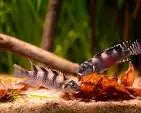Nanochromis transvestitus – Rare Dwarf Cichlid
Nanochromis transvestitus – Rare Dwarf Cichlid
15 in stock
Couldn't load pickup availability
Nanochromis transvestitus – Rare Dwarf Cichlid
The Nanochromis transvestitus is a rare and striking dwarf cichlid native to the Congo River basin in Africa. Known for its deep red and black coloration, bold personality, and fascinating breeding behaviors, this species is a favorite among advanced aquarists and cichlid collectors.
Males and females are very similar in coloration (which is why they are named transvestitus), with females often being slightly smaller and sometimes more vividly marked during breeding. Best kept in pairs or small groups, they thrive in a well-decorated aquarium with caves, rocks, and driftwood for hiding and spawning.
Highlights:
- Rare West African dwarf cichlid species
- Beautiful red, brown, and black coloration
- Peaceful with care, but territorial when breeding
- Best kept as a pair in well-structured aquariums
- Fascinating breeding and parental care behaviors
Care Guide:
- Scientific Name: Nanochromis transvestitus
- Adult Size: ~2–3 inches
- Tank Size: 20+ gallons (long tank preferred)
- Diet: Omnivore – accepts high-quality flakes, pellets, frozen, and live foods
- Water Parameters:
- Temperature: 75–80°F
- pH: 6.0–7.5
- Hardness: Soft to moderately hard water
- Temperament: Semi-peaceful; territorial when spawning
- Tank Mates: Tetras, rasboras, peaceful catfish, other dwarf cichlids with caution
FAQs:
Q: Can Nanochromis transvestitus be kept in community aquariums?
A: Yes, with peaceful tank mates, but they may become territorial during breeding.
Q: How do they breed?
A: They are cave spawners; provide rock caves or coconut shells. The female guards the eggs while the male defends the territory.
Q: Are they beginner-friendly?
A: Better for intermediate to advanced aquarists due to their specific water needs and territorial behavior.

